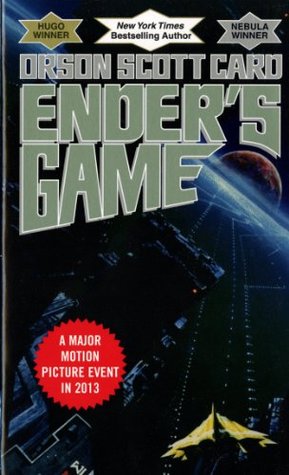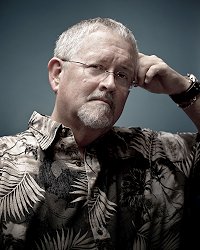Ender's Game (The Ender Quintet #1) by Orson Scott Card
 Release Date: July 15, 1985
Release Date: July 15, 1985Genre: Young Adult, Science Fiction
Publisher: Tor Science Fiction (Macmillan)
Pages: 352
Format: eBook
Source: Purchased by Reviewer
Goodreads • Amazon





In order to develop a secure defense against a hostile alien race's next attack, government agencies breed child geniuses and train them as soldiers. A brilliant young boy, Andrew "Ender" Wiggin lives with his kind but distant parents, his sadistic brother Peter, and the person he loves more than anyone else, his sister Valentine. Peter and Valentine were candidates for the soldier-training program but didn't make the cut—young Ender is the Wiggin drafted to the orbiting Battle School for rigorous military training.
Ender's skills make him a leader in school and respected in the Battle Room, where children play at mock battles in zero gravity. Yet growing up in an artificial community of young soldiers, Ender suffers greatly from isolation, rivalry from his peers, pressure from the adult teachers, and an unsettling fear of the alien invaders. His psychological battles include loneliness, fear that he is becoming like the cruel brother he remembers, and fanning the flames of devotion to his beloved sister.
Is Ender the general Earth needs? But Ender is not the only result of the genetic experiments. The war with the Buggers has been raging for a hundred years, and the quest for the perfect general has been underway for almost as long. Ender's two older siblings are every bit as unusual as he is, but in very different ways. Between the three of them lie the abilities to remake a world. If the world survives, that is.
Winner of the Hugo and Nebula Awards.
Ender was only six when he was shipped off to Battle School.
He was only nine when they made him a commander.
He was only eleven when they placed the fate of the entire human race on his shoulders.
I don't even know where to begin.... This book has been an emotional roller coaster for me.
I guess—I guess I'll start with the fact that I'm way late to the party. This book has been on my to-read list since I saw the first trailer for the movie. I'm one of those people who has to read the book before I see the movie, and at least I can say that I stayed true to that conviction. So now I have a movie to watch!
But in all seriousness, it did take me a while to find my stride with Ender's Game. The way it is written can be difficult to get around. It's a style that definitely put me off (and by looking around, it put off quite a few others too), but I'm extremely happy I decided to stick with it. It had the feel of experimental writing and I am definitely a conservative when it comes to writing styles. Maybe that makes me close-minded, but what can I say—I like what I like.
Style aside, I want to talk about the context of this novel. I always romanticized the idea of being trained to kick-ass since I was little—I mean, imagine being able to pummel anybody's ass without even thinking about it—but Ender's story has completely turned me off of this ideal. It made me realize what a sick fantasy I had been living. Of course, I would still love to be able to kung-fu somebody's ass if need be, but having been trained for it? Having that training consume my childhood? That's a nightmare, and I'm so sorry that Ender had to experience it. It wasn't fair—but that's the whole point. Life isn't fair for everybody—a boy's childhood is nothing compared to the fate of an entire race. Sacrifices have to be made in war for the benefit of many.
What is most terrifying about it is that I can see the necessity of it. I can clearly follow the rationalization of turning children into killers without their explicit knowledge. I don't agree with it, but I can see how humanity would come to this conclusion. And under certain circumstances, I can see how this could become a reality.
I just... I can't even—WORDS! Ugh. My feelings about everything are just too complex to put into words. So I'm sorry for my inevitable failure, but I'll do my best to encapsulate my meanings.
Ender is brilliant—smarter than I can ever hope to be, probably—but he is still a child. Although, I frequently forgot that. In my mind I continuously imagined him as a boy in his late teens and was always extremely alarmed when I was reminded that he is barely into the first decade of his life. The way he conducts himself is just so mature for his age (for the most part... he does have the occasional slip up, but who could blame him?). Ender is a six-twelve year-old with the wisdom of somebody in their winter years. But, he's still a kid, and, because of his age, he is constantly taken advantage of. He is manipulated at every turn to become something he doesn't want to be, something he fears becoming: a killer. I would have to argue that the adults are the true enemies in this universe, not the buggers. What they did was necessary, but it was still cruel and it was still wrong.
And I have to digress before this turns into a full-fledged rant.
Time to focus on the positives: Ender's Game does a wonderful job of exploring the many relationships that are essential to a child. It explores the depths to which a child can love another and tests the nature of friendships. Probably half of the reason I became so engrossed in this story was because of the multitude of interactions Ender has. I found that I was constantly moved by how he related to his peers, siblings, and adults. Some relationships were beautiful and pure; others were sickening to witness; all were so fundamentally human. And that is what this novel does best, in my opinion, encapsulate what humanity is. What our purpose is. It is so pragmatic that it is mind-blowing.
Also, the way this book ended was greatly appreciated. I mean, the closing of the bugger war story-arch was predictable, but the actual ending was profound. It ended on a hopeful note. A chance for redemption. And that pacified me. Because I swear, if Ender didn't get any semblance of a happy ending, I was going to jump straight into Orson Scott Card's universe and destroy humanity.
And on a completely unrelated and unimportant note: the buggers definitely reminded me of the Rachni in Mass Effect 2. If you've played it, great! If you haven't, I strongly suggest you do, because the Mass Effect trilogy has a beautiful story arch.
But anyway, I would absolutely recommend this book to anyone. It's definitely a heavy read, but I am supremely happy I did it. I plan on reading the rest of the series, but I need a break and there's already a lot on my shelf.
Consider me a fan.

About the Author
Orson Scott Card is the author of the novels
Besides these and other science fiction novels, Card writes contemporary fantasy (Magic Street, Enchantment, Lost Boys), biblical novels (Stone Tables, Rachel and Leah), the American frontier fantasy series The Tales of Alvin Maker (beginning with Seventh Son), poetry (An Open Book), and many plays and scripts, including his "freshened" Shakespeare scripts for Romeo & Juliet, The Taming of the Shrew, and The Merchant of Venice.
Card was born in Washington and grew up in California, Arizona, and Utah. He served a mission for the LDS Church in Brazil in the early 1970s. Besides his writing, he teaches occasional classes and workshops and directs plays. He frequently teaches writing and literature courses at Southern Virginia University.
Card currently lives in Greensboro, North Carolina, with his wife, Kristine Allen Card, where his primary activities are writing a review column for the local Rhinoceros Times and feeding birds, squirrels, chipmunks, possums, and raccoons on the patio.
No comments:
Post a Comment
We'd love to hear what you think!